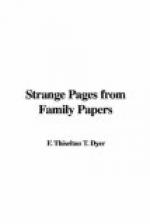But the most remarkable part of the story remains to be told. By a strange coincidence the prophetic utterance of Howgill was fulfilled in a striking manner, for all the children of Justice Duckett died without leaving any issue, whilst some of them came to actual poverty, one begging her bread from door to door. Grayrigg Hall passed into the possession of the Lowther family, was dismantled, and fell into ruins, little more than its extensive foundations being visible in 1777, and, after having long been the habitation of “owls and jackdaws,” the ruins were entirely removed and a farmhouse erected upon the site of the “old hall,” in accordance with what was popularly known as “The Quaker’s Curse, and its fulfilment.” Cornish biography, however, tells how a magistrate of that county, Sir John Arundell, a man greatly esteemed amongst his neighbours for his honourable conduct—fell under an imprecation which he in no way deserved. In his official capacity, it seems, he had given offence to a shepherd who had by some means acquired considerable influence over the peasantry, under the impression that he possessed some supernatural powers. This man, for some offence, had been imprisoned by Sir John Arundell, and on his release would constantly waylay the magistrate, always looking at him with the same menacing eye, at the same time slowly muttering these words:
“When upon the yellow
sand,
Thou shalt die by human hand.”
Notwithstanding Sir John Arundell’s education and position, he was not wholly free from the superstition of the period, and might have thought, too, that this man intended to murder him. Hence he left his home at Efford and retired to the wood-clad hills of Trevice, where he lived for some years without the annoyance of meeting his old enemy. But in the tenth year of Edward iv., Richard de Vere, Earl of Oxford, seized St. Michael’s Mount; on hearing of which news, Sir John Arundell, then Sheriff of Cornwall—led an attack on St. Michael’s Mount, in the course of which he received his death wound in a skirmish on the sands near Marazion. Although he had broken up his home at Efford “to counteract the will of fate,” the shepherd’s prophecy was accomplished; and tradition even says that, in his dying moments, his old enemy appeared, singing in joyous tones:
“When upon the yellow
sand,
Thou shalt die by human hand.”
The misappropriation of property, in addition to causing many a family complication, has occasionally been attended with a far more serious result. There is a strange curse, for instance, in the family of Mar, which can boast of great antiquity, there being, perhaps, no title in Europe so ancient as that of the Earl of Mar. This curse has been attributed by some to Thomas the Rhymer, by others to the Abbot of Cambuskenneth, and by others to the Bard of the House at that epoch. But, whoever its author, the curse was delivered prior to the elevation of the Earl, in the year 1571, to be the Regent of Scotland, and runs thus:




